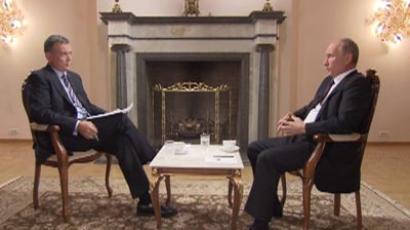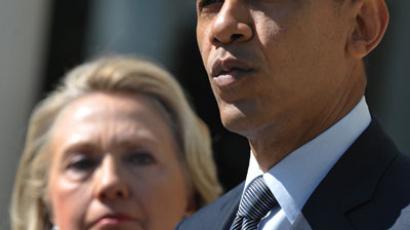‘US will think twice before supporting Islamic radicals’
The recent outbreak of violent anti-American protests in the Muslim world will make US politicians think twice before supporting Islamic radicals, political analyst and ex-jihadist Tawfik Hamid said in an interview with RT.
The US has funded Islamists groups throughout the world for decades, and the death of the American ambassador to Libya is just one more example of how militants backed by radical Islamic ideology will eventually turn their weapons against their patrons in Washington. In this light, Hamid believes that the idea of toppling Syria’s President Bashar Assad and replacing him with rebels known to have connections to Al-Qaeda should no longer seem like such a winning idea to the West.
RT: What do you think of the events in the Arab world right now?Tawfik Hamid: I see an expression of radicalism in the form of attacking embassies and killing ambassadors, and expressing this violence in the radical ways of thinking that proliferated in the last few decades in the Muslim world. It is expressing itself in this form as it also expressed itself in Afghanistan in beheading people. But that is a different kind of violence. It is based on the same thinking of accepting the use of violence to suppress others, and preventing them from saying their opinion or preventing them from saying things that you perceive as insulting. RT: Do you think it is happening especially in the countries that have gone or are still going through transition?TH: The general underlying cause is religious principles, that whoever says a bad word against the Prophet Muhammad must be killed, which is not in the Koran but it is one of the mainstream beliefs in some Islamic books. Also, the excess of love for Prophet Muhammad makes Muslims feel that [in case of] any insult towards him, they have the responsibility to defend him. Especially according to Islamic traditional teaching that sinners go to hell, and that the Prophet Muhammad is the one who will intercede to bring them from hell to paradise. It is not gold that will do this, it is the Prophet Muhammad’s intercession. So, there is an excessive emotional feeling toward the Prophet Muhammad because of this.This is an underlying factor. But there are local reasons as well, in Egypt for example. In Egypt, you have the role model of Essam Sharaf, one of the former Prime Ministers after the revolution, who actually celebrated the young man who took the flag of the Israeli embassy and burned it while a mob surrounded the embassy. Instead of punishing him and considering him a criminal for such an act, for attacking the Israeli embassy, [Essam Sharaf] actually celebrated him in the media. This is providing a very bad role model.In Libya, the situation is different: You have many well-trained radicals who have military power in their hands, who can make the decision to attack the embassy based on the movie [the US-made anti-Islamic movie ‘Innocence of Muslims’], or based on a prior arrangement.RT: A lot of people, even US officials, are saying that this was a pre-planned attack and that the film may have nothing to do with this. Do you agree to this? TH: It is a possibility, I cannot deny that it is one of the possibilities. But also, there is the possibility that this movie incited excessive hatred and a desire to use violence against the US. And [an attack] could then be easily implemented, because there are well-trained fighters with weapons, even artillery. So, it is not that difficult, if you have been fighting Gaddafi for more than a year, to take weapons and go attack the embassy. Both possibilities are valid.RT: The groups that attacked the US embassy were funded and trained by the US – in some cases – during the revolution in Libya. Do you think that the US did not see this coming? Especially after what happened in Afghanistan back in 1970s to 1980s, and now we see the results with the Taliban?TH: I think people do not learn from history very well. It is one of the problems of humans: They don’t learn from history and they follow advice without really going into enough depth of understanding of culture and mindset, the religious things. Some of these [Libyan] radicals who were probably supported by NATO may have access to such weapons, because when Gaddafi’s government and the whole system collapsed they had easy access. Really, there is a big problem in dealing with Middle East issues.RT: Do you think the US expected the democracy that they were promising to Libyans and Egyptians and other nations in the Arab world, that this will be the result of the democracy they were promising?TH: Obviously not. You see [US Secretary of State] Hillary Clinton, for example, clearly saying that ‘how can this happen in the country that we helped to get freedom?’ They are really shocked. The Americans and NATO helped them expecting that they will reciprocate by at least showing some liberties and respect for others, at least for America. But they underestimated the threat of radical Islam – as they did in Iraq. And the main factor in this threat is ideology. If you don’t deal with this ideology, you cannot win this game.If you focus on two things, democracy and military power, it is like if someone who knows how to change a tire of a car thinks that fixing a complex electronic component of the car can be done by changing tires. No, it will not. You need to go to a completely different dimension here. That is to deal with religious ideology, whether you admit it or not – you have to deal with it. RT: Especially because a lot of people were telling the US [the militants] are with Al Qaeda. In your articles you do talk about this.TH: I’m one of the people who clearly stated that if you want to implement a democracy – avoid the ‘sudden democracy’ syndrome. It will bring the Islamists to power, and we will sufferRT: Would you say that the US simply does not understand the nature of the Arab world? The fact is, the democracy they wanted to impose is a complete failure right now.TH: There are [American] people who understand, and people who do not understand, and it depends on the balance of powers in certain times in history when the decisions are being taken. Unfortunately I don’t think the decisions taken here are very correct. RT: Do you think the US will change its strategy in the Arab world and the countries going through transitions, in light of what is going on?TH: Yes, absolutely. For example, there will be many voices that will start questioning if removing [Syrian President Bashar] Al-Assad is a good idea or not. Supporting the rebels can ultimately bring extreme radicals [to power in Syria], who will become enemies to America and attack it. It doesn’t work the way people think. The Libyan example of the killing of the ambassador in such a way, and the spread of the reaction in several Islamic societies, will make many people think twice before supporting rebels against Al-Assad. I cannot say it will be a game change in this respect, but I can say it will make many people think twice about the issue of supporting the rebels against Al-Assad.RT: But will they actually make decisions that are different from those made before? Will they reconsider their strategy?TH: It is likely; there is a 60 percent possibility that decisions may have some changes or modifications, especially now that the Syrian issue is hot. I know it was a policy to remove Al-Assad but I think with the Libyan issue it will make the voices of the people, who were against Assad’s removal, more prominent and better heard.But it is very hard to guarantee an outcome, because it depends on different powers and ultimate intentions; it is not something where you can easily say ‘it will change’.RT: How do you see relations between the US and the countries that are going through transition, Libya and Egypt in particular, especially after the latest protests?TH: It will certainly create a new way of thinking in relations with these people. I think it might affect [American] donations that go to Egypt. The [US] Congress is supposed to allow $1 billion donations to support Egypt. I believe many people in Congress will think twice whether this is appropriate, without having guarantees from [current President of Egypt Mohamed] Morsi that he will really respect the values of democracy. The problem is that many societies understand democracy as just a ballot, while the West understands democracy as transparency, freedom of speech and respect for minorities. There are two completely different understandings of the same word. In the West, it is understood as these values, but elsewhere in the world it is understood as the majority suppressing the minority and dominating everything.RT: If Congress is going to reconsider its aid to Egypt for preconditions – isn’t that another form of conditions the Arab world is sick and tired of, and the reason for the protests?TH: I think if you’re giving donations, you have a full right to put conditions on it, because it is extremely unwise to give someone donations and at the end they will promote an ideology of hatred to you that can ultimately cause you damage. So, when the US is giving someone donations on that high level, it is fair to insist on certain conditions.RT: Would you say the US will start working on its relations with the Arab world, with the peoples instead of governments? TH: I think they will become more aware of fighting radical ideology, they cannot just ignore it. It is not simply a military solution, or using democracy to solve the problem.














